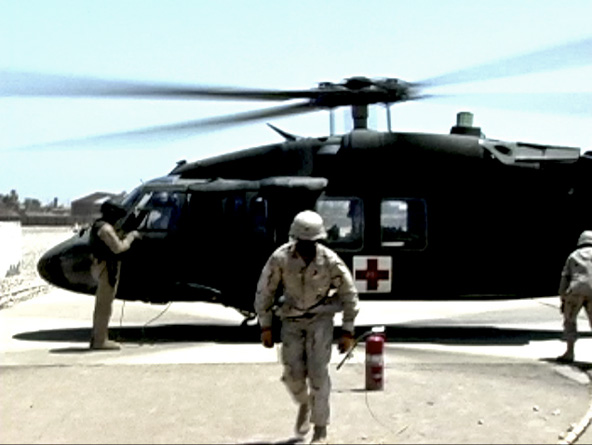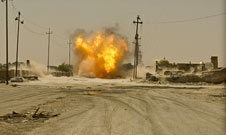
June, 2004, Taji, Iraq. Black Hawk helicopter reconfigured to carry wounded preparing to depart on a mission.
Video Still: Phillip Robertson
The medical mission to Badiat was the first of two daytime missions. The second wasn't medical. On Tuesday, the commander of Charlie Company from Khadimiya was going out on an administrative housecall. A young Tennesseean named Patrick McFall was going out to Sobibor north of Baghdad to meet with the Neighborhood Advisory Council on city business because in the absence of a legitmate Iraqi authority, McFall is working as their Irish- American caliph. He was busy trying to award reconstruction contracts and explain how to apply for the ICDC and getting frustrated with the lack of progress. I rode out there in an armored hospital vehicle, which has no air conditioning and is as loud as a jet engine inside. When we arrived at Sobibor, the medics opened the hatch and treated Iraqi kids for various injuries, he dressed wounds and communicated as best as he could without a translator and it took no time at all before a crowd gathered. Soldiers from Charlie Company handed out more candy, which drew more kids.
It was impossible to move around and the mob wanted the notebook I was using, the pen, my watch. You can't have the watch, the pen, the notebook, I explained. They had a million repeated questions. Mister, where do live? Are you married? Do you have kids? Mister, Whatisyourname? The tall ones squeezed my biceps testing their strength, tried to sell me pepsi, forced me to record a speech into a tape player, showed me ancient wounds. They cheered and heckled. Meanwhile, their older relations watched balefully from across the parking lot. The Iraqi child mob swelled and roiled. Not one of them grabbed for my wallet. They were good. Charlie Company threw out more stuff when the mob dwindled. At one point the kids were chanting Bush's name. I retreated to the steps of the building where McFall was meeting with the local authorities.
Past the gates it was perfectly calm, the kids were outside near the vehicles. On the steps a few soldiers were providing security for the doors. This is where I met a man named Lieutenant McCarthy from Charlie Company, McFall's executive officer. I told him I had to take a break from the mob outside. He was sympathetic. "Last time we let about 20 of them inside the gates. Yeah, we did that because the Iraqis don't shoot at us when there are a lot of kids around." McCarthy paused for a second, then said, "But don't write that." I would hear this once more at Banzai, about children used as an insurance policy against attack. It could have been pure superstition but McCarthy believed it.
As it turned out, the members of Charlie Company had gone out to Sobibor under the threat of an ambush, and they were nervous about what would happen in the town. McFall had taken precautions by placing other vehicles on routes out of Sobibor, while the rest of the convoy circled the town. Not a shot was fired. McFall and his company were out there, exposed, to meet with local leaders who didn't understand what they were talking about. The men wanted to go home without facing another volley of rocket-propelled grenades.
When the candy was gone, we pulled out.
On the evening after the Badiat mission, a mortar landed and threw out a mushroom cloud of dust, but I only saw this later, after the concussion. I was standing, slightly puzzled in the moment after it landed, near the basketball court for the Khadimiya base. An American soldier ran up to me, all panicked and out of breath and asked me, "Tal Inglisi?" which is rough Arabic for "do you speak English?" I said I was a reporter from California. "Sir, really sorry. We're looking for the individual calling in the mortar strikes. He's around here somewhere." The soldier ran off, and his buddies were doing the same thing, hoping to catch an Iraqi on a cell phone who was directing the mortar barrage from the base itself.
However they managed it, the insurgents have a perfect fix on their command post. Firing from across the river in A'adamiya, several kilometers away, the shells were landing within feet of the building, throwing shrapnel in every direction. Mortars have even dropped through into the courtyard. After the soldier went off to find his suspect, another mortar exploded close by so we sprinted into the basement of a nearby building. In fact, this was a fairly ordinary day at the base. At Charlie company farther down the road, they didn't even look up when the shells landed. In this particular barrage, there were no casualties, but soldiers from the base have been seriously injured in recent attacks and Medevac'd to the combat support hospital.
Back at the aid station, I asked why the special forces didn't go out and find the insurgents behind the mortar attacks. The answer came back that the zone across the river belonged to another unit. "That's not us, " the soldier told me. "At one time, we had all eight mortar positions mapped out, but we couldn't do anything about it." The man shrugged helplessly. It's the depressing accuracy of the mortar attacks that makes everyone on the base think there's a rat on the inside.
Angry sermons from the mosques across the river in Adamiya came through the soft evening air. The wind mixed up the sound. Light was falling, and the temperature drifted out of the triple digits. Melendrez was hanging out talking to a few of the medics in front of the aid station when he caught sight of a soldier walking down the road in full battle dress. Melendez couldn't stop laughing. "Shit. Look, it's Bose!" Bose had put on his flak jacket, goggles and helmet to walk back from the Internet cafe when everyone else was wearing shorts and tee shirts in the heat. Bose looked like an astronaut and I didn't recognize him until I could read his name tag. He was in full battle dress because he was worried about mortars that kept landing near the command post he had to skirt on the way to the aid station.
Dr. Bose was awarded the Bronze Star for his bravery and service to his country. He is now practicing medicine in Chicago.
We remain friends to this day.
 LEAD IMAGE: 2004, Iraq. A roadside bomb detonating in Iraq, the cause of the majority of injuries to U.S. personnel in Iraq.
LEAD IMAGE: 2004, Iraq. A roadside bomb detonating in Iraq, the cause of the majority of injuries to U.S. personnel in Iraq.Photo: Sudip Bose
© Phillip Robertson, 2009-2014.
